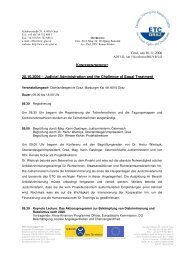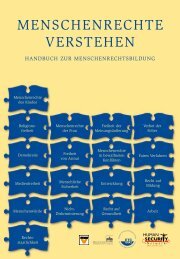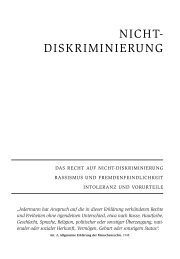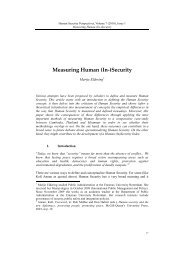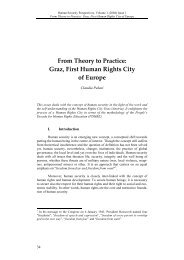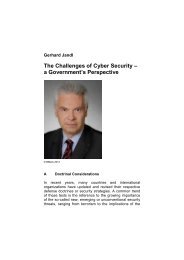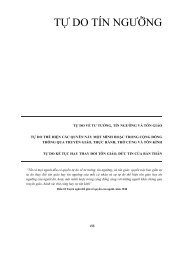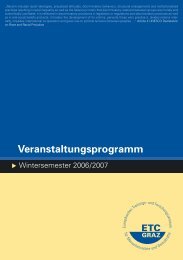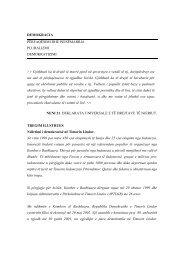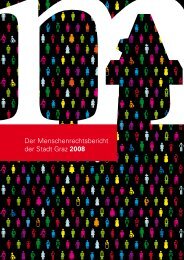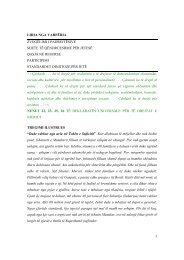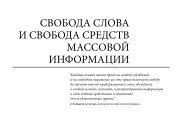deutsch/english - ETC Graz
deutsch/english - ETC Graz
deutsch/english - ETC Graz
- TAGS
- graz
- www.etc-graz.at
Sie wollen auch ein ePaper? Erhöhen Sie die Reichweite Ihrer Titel.
YUMPU macht aus Druck-PDFs automatisch weboptimierte ePaper, die Google liebt.
Train-the-Trainers-Workshop zur<br />
Menschenrechtsbildung in Bamako, Mali<br />
Der vom europäischen Trainings- und Forschungszentrum für<br />
Menschenrechte und Demokratie (<strong>ETC</strong>) <strong>Graz</strong> gemeinsam mit<br />
PDHRE Mali im Zeitraum von 14. bis 18. Februar in Bamako,<br />
Mali, durchgeführte Train-the-Trainers-Workshop zur Menschenrechtsbildung<br />
brachte 25 TeilnehmerInnen aus Mali sowie<br />
elf weiteren Ländern Westafrikas zusammen. Grundlage<br />
des Workshops war die französische Version des Handbuches<br />
für Menschenrechtsbildung, die von PDHRE Mali übersetzt<br />
worden war. Der Großteil der TeilnehmerInnen stammte aus<br />
dem NGO-Bereich, ein Teil aus Justiz- und Bildungsministerien.<br />
Darunter waren auch mehrere VertreterInnen von Menschenrechtsstädten<br />
aus Mali und Senegal. Für das <strong>ETC</strong> war Wolfgang<br />
Benedek in Bamako, der gemeinsam mit Kathleen Modrowski<br />
von PDHRE New York und lokalen TrainerInnen das Programm<br />
gestaltete. Zur Eröffnung war die Justizministerin ebenso erschienen<br />
wie der Generalsekretär des Außenministeriums.<br />
Besonderes Augenmerk wurde den Menschenrechten der<br />
Frau und der Genderperspektive im Menschenrechtsschutz im<br />
Allgemeinen gewidmet. Bei dieser Gelegenheit fand die Gründung<br />
von PDHRE Afrika statt, welche ein gesamtafrikanisches<br />
Netzwerk für Menschenrechtsbildung anstrebt.<br />
Der Workshop wurde aus Mitteln der österreichischen Entwicklungsagentur<br />
(ADA) des Außenministeriums finanziert.<br />
Herkunftslandrecherche<br />
Am 25. Februar fand in Zusammenarbeit mit dem Roten Kreuz,<br />
ACCORD, im Rahmen der Refugee Law Clinic ein Seminar zur<br />
Herkunftsländerrecherche im Asylverfahren für StudentInnen,<br />
RechtsberaterInnen und RechtsanwältInnen statt. Das Seminar<br />
wurde von Martin Stübinger, ACCORD, und Klaus Starl durchgeführt.<br />
Sicherheitsakademie: Staat und Menschenrechte<br />
Erstmalig wurde am 6. und 7. März im Auftrag der Sicherheitsakademie<br />
des Innenministeriums unter dem Titel „Staat und<br />
Menschenrechte“ ein Menschenrechtstraining für Exekutivbeamte<br />
abgehalten. Als TrainerInnen fungierten Wolfgang<br />
Benedek, Gudrun Rabussay sowie Peter André, Menschenrechtskoordinator<br />
des Innenministeriums. Das Programm umfasste<br />
Grundlagen der Menschenrechte, Menschenrechtsfälle<br />
vor dem Europäischen Gerichtshof für Menschenrechte, die<br />
Tätigkeit des Menschenrechtsbeirates des Innenministeriums<br />
und allgemeine Fälle von praktischer Bedeutung für die Exekutive<br />
u.a.<br />
Menschenrechte in der Informationsgesellschaft<br />
Am 25. April fand am <strong>ETC</strong> der zweite Workshop zum Thema<br />
„Menschenrechte in der Informationsgesellschaft“ unter der<br />
Leitung von Wolfgang Benedek und Catrin Pekari statt. Dieser<br />
Workshop war Teil des Forschungsprojektes über „Menschenrechte<br />
in der Informationsgesellschaft“, das mit der Unterstützung<br />
des Fonds für Wissenschaftliche Forschung am Institut<br />
für Völkerrecht angesiedelt ist. Ziel des Projektes ist die Erforschung<br />
der Auswirkungen der Informationsgesellschaft, wie<br />
sie im Zusammenhang mit dem UNO-Weltgipfel über die Informationsgesellschaft<br />
in Genf 2003 und Tunis 2005 behandelt<br />
werden, auf die Menschenrechte und dabei insbesondere Fragen<br />
des Datenschutzes, der geistigen Eigentumsrechte und<br />
der Meinungsäußerungs- sowie der Medienfreiheit. Fragen<br />
der digitalen Kluft und des Umgangs mit der Informationsgesellschaft<br />
auf österreichischer Ebene wurden ebenso diskutiert<br />
wie ein mögliches „Menschenrecht auf Kommunikation“. Die<br />
sentatives of the Human Rights Cities in Mali and Senegal. The<br />
<strong>ETC</strong> was represented by Wolfgang Benedek, who implemented<br />
the workshop together with Kathleen Modrowski (PDHRE<br />
New York) and local trainers.The minister of Justice and the secretary-general<br />
of the Ministry of Foreign Affairs were present<br />
at the opening. Special emphasis was laid on human rights of<br />
women and the gender perspective in general human rights<br />
protection. At the same occasion PDHRE Africa was founded,<br />
which aims at building a Pan-African network on human rights<br />
education. The workshop was financed by means of the Austrian<br />
Development Agency.<br />
Country of Origin Information<br />
On 25 February, a seminar on country of origin research in asylum<br />
procedures for students, legal advisors and lawyers was<br />
carried out in the framework of the refugee law clinic in cooperation<br />
with the Red Cross, ACCORD. The seminar was conducted<br />
by Martin Stübinger, ACCORD, and Klaus Starl.<br />
Security Academy: State and Human Rights<br />
For the first time, a seminar on “State and human rights“ for<br />
police officers was conducted on commission by the Security<br />
Academy of the Austrian Ministry of Interior. Wolfgang Benedek,<br />
Gudrun Rabussay and Peter André, Human Rights Coordinator<br />
of the Austrian Ministry of Interior served as trainers.<br />
The programme contained basics of human rights, human<br />
rights cases before the European Court of Human Rights, the<br />
activities of the Human Rights Advisory Board of the Austrian<br />
Ministry of Interior and general cases of practical relevance for<br />
the police.<br />
Human Rights in the Information Society<br />
On 25 April, the second workshop on human rights in the information<br />
society took place under the guidance of Wolfgang<br />
Benedek and Catrin Pekari at the <strong>ETC</strong>. This workshop is part of<br />
the research project “Human Rights in the Information Society”,<br />
which is located at the Institute for International Law and supported<br />
by the Austrian Fund for Scientific Research. The aim of<br />
the project is the exploration of the effects of the information<br />
society on human rights, especially data protection, intellectual<br />
property and the freedom of expression and the media, as<br />
dealt with at the UN World Summit on the Information Society<br />
in Geneva 2003 and Tunis 2005. Questions of the digital divide<br />
as well as of the treatment of the information society at<br />
the Austrian level were discussed as well as the “human right<br />
to communication“. The contributions of the different lecturers<br />
will be published together with the contributions from the first<br />
workshop in October 2004.<br />
Children’s books and Human Rights<br />
“From the black “Mohr“ to the “Red Zora“ to “Harry Potter“<br />
– Reading children’s books with the human rights’ eye“ was<br />
the title of a workshop for kindergarten teachers and primary<br />
school teachers on 11 May, hosted by Claudia Pekari and Barbara<br />
Schmiedl who gave an introduction to more or less politically<br />
correct children’s literature.<br />
Human Rights training for Moldovan<br />
human rights focal points<br />
From 5 to 9 September, a training for the implementation of the<br />
National Action Plan for Human Rights took place at the <strong>ETC</strong><br />
on commission of UNDP Moldavia. The goals of the one-week<br />
seminar with 19 participants from various fields were to discuss<br />
the agenda of the Moldovan Action Plan of Human Rights,<br />
Beiträge der verschiedenen ReferentInnen werden zusammen<br />
mit den Beiträgen des ersten Workshops vom Oktober 2004 in<br />
einer eigenen Publikation erscheinen.<br />
Kinderliteratur und Menschenrechte<br />
Unter dem Titel „Vom ‚kohlpechrabenschwarzen Mohr’ über<br />
die ‚rote Zora’ bis ‚Harry Potter’. Kinder- und Jugendbücher lesen<br />
mit Blick auf die Menschenrechte – Workshop für KindergartenpädagogInnen<br />
und Grundschullehrkräfte“ gaben am 11.<br />
Mai Claudia Pekari und Barbara Schmiedl einen Einblick in das<br />
weite Feld politisch mehr oder weniger korrekter Literatur für<br />
die jungen und jüngsten LeserInnen.<br />
Menschenrechtstraining für moldawische<br />
Menschenrechtsbeauftragte<br />
Von 5. bis 9. September fand am <strong>ETC</strong> im Auftrag des UNDP<br />
Moldawien ein Training zur Umsetzung des National Action<br />
Plan for Human Rights statt. Ziel dieses einwöchigen Seminars<br />
für 19 TeilnehmerInnen aus allen Ebenen der moldawischen<br />
Verwaltung, Human Rights Focal Points und NGOs sowie<br />
MenschenrechtstrainerInnen war es vor allem, Strategien zu<br />
Implementierung und Monitoring des National Action Plan, die<br />
Realisierung von Partnerschaften und Kooperationen zwischen<br />
NGOs und staatlichen Behörden, Methodik der Menschenrechtsbildung<br />
und Menschenrechtsbildung als Mittel zur Implementierung<br />
sowie Strategien und Methodik für den Menschenrechtsschutz<br />
auf lokaler Ebene zu erarbeiten.<br />
Im Laufe der Trainingswoche wurden vom Team des <strong>ETC</strong> und<br />
externen ExpertInnen folgende Themen behandelt: Strategieanalyse<br />
des moldawischen Nationalen Aktionsplans, Durchsetzung<br />
von Menschenrechtsstandards und Mechanismen auf<br />
lokaler Ebene, kulturelle Vielfalt und Integration als kommunale<br />
politische Perspektive, Monitoring-Strategien anhand von Erfahrungen<br />
des österreichischen Menschenrechtsbeirats, Lobbying<br />
und strategische Planung, Förderung von Kooperation<br />
durch den Aufbau von Partnerschaften und Netzwerken, verschiedene<br />
Ansätze der Förderung von Menschenrechten auf<br />
lokaler Ebene (Menschenrechtsstadt, Städtekoalition gegen<br />
Rassismus, Europäische Charta für den Schutz der Menschenrechte<br />
in der Stadt), Präsentation von lokalen Projekten und<br />
Best Practices sowie die Sicherung des Rechts auf Leben und<br />
Unversehrtheit durch die Setzung von Standards.<br />
Menschenrechtstraining für ukrainische<br />
Grenzbehörden und Studierende<br />
Im Auftrag der Caritas Österreich führte das <strong>ETC</strong> von 23. bis<br />
27. Oktober ein Menschenrechtstraining in Uzhgorod, Ukraine,<br />
durch. Gudrun Rabussay und Klaus Starl trainierten TeilnehmerInnen<br />
der Refugee Law Clinic in Zusammenarbeit mit UNHCR<br />
Kiew und der American Bar Association. Inhalt des Trainings waren<br />
eine Einführung in die Menschenrechte, Menschenrechte<br />
und Verfahren zur Feststellung der Flüchtlingseigenschaft, Herkunftsländerrecherche<br />
sowie Diskriminierung als Fluchtgrund.<br />
Ein Tag war dem Menschenrechtstraining für BeamtInnen der<br />
ukrainischen Grenzpolizei und Grenzbehörden gewidmet. Inhalt<br />
des Trainingstages war eine Einführung in das Menschenrechtssystem,<br />
Überwachungsmechanismen und die Standards<br />
des CPT für fremdenrechtliche Anhaltezentren.<br />
Arbeit und Menschenrechte<br />
Am 2. November fand in Kooperation mit der Otto Möbes-<br />
Schule der Arbeiterkammer Steiermark das erste Menschenrechtsseminar<br />
im Rahmen des Trainings für BetriebsrätInnen<br />
statt. Wolfgang Benedek und Barbara Schmiedl referierten über<br />
- 10 - - 11 -<br />
to present and discuss various implementation, evaluation and<br />
monitoring strategies, to investigate mechanism of establishing<br />
partnerships between NGOs and public authorities, to<br />
promote the realization of cooperation and dialogue between<br />
NGOs and authorities, to present ways how to coordinate activities<br />
of various sectors (education, medicine, social …), to<br />
raise awareness about human rights education as a tool for human<br />
rights implementation, to investigate human rights education<br />
as well as training methodology, to learn about procedures<br />
and methods of human rights at the local level. The <strong>ETC</strong> team<br />
and external experts therefore presented the following topics<br />
to the participants: Analysis of the Moldovan Action Plan; Strategies,<br />
Opportunities and Ways of Monitoring – Experiences of<br />
the Austrian Human Rights Advisory Board; Lobbying and Strategic<br />
Planning; Promotion of Human Rights at the Community<br />
Level – different Approaches (The Concept of Human Rights Cities,<br />
the European Coalition of Cities against Racism, The European<br />
Charta for the Safeguarding of Human Rights in the City);<br />
Implementation of Human Rights Standards, Mechanisms and<br />
Systems at the local level; Cultural Diversity and Integration –<br />
communal political Perspectives to act on the Example of <strong>Graz</strong>;<br />
Presentation of Local Projects and best practices; Ensuring the<br />
Right to Life, Physical and Psychic Integrity: Standards for the<br />
Detention and Protection of the Rights of the detainees.<br />
Human Rights training for Ukrainian<br />
border guards and students<br />
From 23 to 27 October, the <strong>ETC</strong> carried out a human rights training<br />
in Uzhgorod, Ukraine, with which it was commissioned by<br />
Caritas Austria. Gudrun Rabussay and Klaus Starl trained participants<br />
of the Refugee Law Clinic in cooperation with UNHCR<br />
Kiev and the American Bar Association. The training contained<br />
an introduction to human rights, human rights and procedure<br />
to determine the refugee status of a person, country of origin<br />
research and discrimination as a reason to flee. One day was<br />
dedicated to the training of officers from the Ukrainian border<br />
police and featured an introduction into the system of human<br />
rights, monitoring mechanisms and the standards of the CPT<br />
for detention centres.<br />
Work and Human Rights<br />
On 2 November the first training seminar on human rights for<br />
union representatives took place in cooperation with the Otto<br />
Möbes School of the Chamber of Employees Styria. Wolfgang<br />
Benedek and Barbara Schmiedl lectured on basics of the right<br />
to work, trained the practical knowledge of the participants in<br />
group activities and raised their attention on the necessity of<br />
awareness raising about human rights.<br />
Violence in schools<br />
On 7 and 8 November, was the kick-off of the new workshop<br />
series on „Boys hit and girls bite - background of and intervention<br />
with male and female violence with special emphasis<br />
on schools“, elaborated in cooperation with the Peace Bureau<br />
<strong>Graz</strong> and offered in cooperation with the “Pädagogisches Institut<br />
des Bundes in Steiermark (PI)”. The first module dealt with<br />
the legal basics and offered an introduction into the theory of<br />
violence. The second module on 14 and 15 December featured<br />
the issues of all forms of psychological violence and traumatization.<br />
The series will have two more workshops in 2006 on<br />
physical and intercultural violence and aims at giving teachers<br />
the theoretical basis, at providing them with options and exercises<br />
as well as at bringing them into direct contact with specific<br />
counselling organisations.





